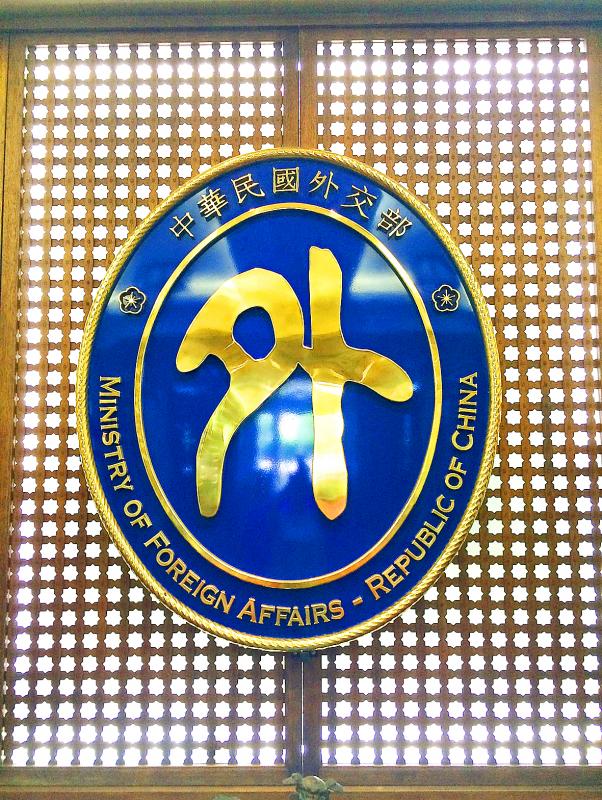Taiwan and the People’s Republic of China are not subordinate to each other, and the Chinese government has no jurisdiction over Taiwanese nationals, the Ministry of Foreign Affairs (MOFA) said yesterday.
The ministry was responding to a report by rights group Safeguard Defenders on Tuesday that said Beijing has pressured foreign governments to deport hundreds of Taiwanese to China.
More than 600 Taiwanese were extradited from numerous countries to China between 2016 and 2019 in an effort to “undermine Taiwanese sovereignty,” the report said.

Photo: Lu Yi-hsuan, Taipei Times
The ministry yesterday listed three rules when handling Taiwanese allegedly involved in telecommunications fraud in other nations.
First, the ministry and its representative offices in the countries in question confirm the number of Taiwanese involved, their names and other pertinent facts, while arranging to visit them in person, ministry spokeswoman Joanne Ou (歐江安) said in a statement.
Second, while the government respects the jurisdictions of other countries, it aims to ensure Taiwanese involved in overseas cases can assert their rights during judicial investigations, she said.
Third, the government immediately asks the country to transfer Taiwanese suspects back to Taiwan for an investigation, she said.
The representative offices also contact the suspects’ families in Taiwan and offer assistance, such as providing a list of available lawyers, to protect their legal rights, she added.
Meanwhile, the Mainland Affairs Council said that Beijing aims to “show its sovereignty over Taiwan” by pushing for the deportations.
“We again [say to] the Chinese side that crime-fighting should not involve politics and we hope law enforcement units on both sides can continue to cooperate ... to effectively fight crime and protect public welfare,” it said in a statement.

Chinese Nationalist Party (KMT) Chairman Eric Chu (朱立倫), spokeswoman Yang Chih-yu (楊智伃) and Legislator Hsieh Lung-chieh (謝龍介) would be summoned by police for questioning for leading an illegal assembly on Thursday evening last week, Minister of the Interior Liu Shyh-fang (劉世芳) said today. The three KMT officials led an assembly outside the Taipei City Prosecutors’ Office, a restricted area where public assembly is not allowed, protesting the questioning of several KMT staff and searches of KMT headquarters and offices in a recall petition forgery case. Chu, Yang and Hsieh are all suspected of contravening the Assembly and Parade Act (集會遊行法) by holding

PRAISE: Japanese visitor Takashi Kubota said the Taiwanese temple architecture images showcased in the AI Art Gallery were the most impressive displays he saw Taiwan does not have an official pavilion at the World Expo in Osaka, Japan, because of its diplomatic predicament, but the government-backed Tech World pavilion is drawing interest with its unique recreations of works by Taiwanese artists. The pavilion features an artificial intelligence (AI)-based art gallery showcasing works of famous Taiwanese artists from the Japanese colonial period using innovative technologies. Among its main simulated displays are Eastern gouache paintings by Chen Chin (陳進), Lin Yu-shan (林玉山) and Kuo Hsueh-hu (郭雪湖), who were the three young Taiwanese painters selected for the East Asian Painting exhibition in 1927. Gouache is a water-based

Taiwan would welcome the return of Honduras as a diplomatic ally if its next president decides to make such a move, Minister of Foreign Affairs Lin Chia-lung (林佳龍) said yesterday. “Of course, we would welcome Honduras if they want to restore diplomatic ties with Taiwan after their elections,” Lin said at a meeting of the legislature’s Foreign Affairs and National Defense Committee, when asked to comment on statements made by two of the three Honduran presidential candidates during the presidential campaign in the Central American country. Taiwan is paying close attention to the region as a whole in the wake of a

OFF-TARGET: More than 30,000 participants were expected to take part in the Games next month, but only 6,550 foreign and 19,400 Taiwanese athletes have registered Taipei city councilors yesterday blasted the organizers of next month’s World Masters Games over sudden timetable and venue changes, which they said have caused thousands of participants to back out of the international sporting event, among other organizational issues. They also cited visa delays and political interference by China as reasons many foreign athletes are requesting refunds for the event, to be held from May 17 to 30. Jointly organized by the Taipei and New Taipei City governments, the games have been rocked by numerous controversies since preparations began in 2020. Taipei City Councilor Lin Yen-feng (林延鳳) said yesterday that new measures by